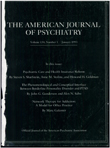The effect of financial management on alcohol-related hospitalization
Abstract
OBJECTIVE: Treatment-unresponsive alcoholics in New Zealand who are unable to care for themselves tend to be hospitalized for lengthy periods of time. The author examined the effect of adding financial management to the therapeutic management of such patients. The null hypothesis was that this would have no effect on the duration of alcohol-related hospitalization. METHOD: All 61 alcoholic patients registered with an alcohol outpatient clinic who received financial management over a period of 6 years were included in the study. Their alcohol-related disabilities were so severe that they had resulted or were likely to result in lengthy or frequent periods of hospitalization. The financial management involved putting each patient's income into a checking account for which a budget advisory officer was cosignatory for withdrawals. The advisor saw to it that patients' basic living requirements were being met and that expenditure on alcohol was not having a detrimental effect. Participation was voluntary for voluntary patients and involuntary for committed patients. The durations of each patient's alcohol-related hospitalizations were compared for two equal periods of time before and after financial management was instituted. RESULTS: The null hypothesis was not supported. The duration of alcohol-related hospitalizations after financial management was instituted was 86% less than it was before such management. CONCLUSIONS: For the patient who is struggling in the face of excessive drinking to cope with the tasks of daily living, including the provision of adequate shelter and nutrition, the benefits of adding financial management to other therapeutic strategies should be considered.
Access content
To read the fulltext, please use one of the options below to sign in or purchase access.- Personal login
- Institutional Login
- Sign in via OpenAthens
- Register for access
-
Please login/register if you wish to pair your device and check access availability.
Not a subscriber?
PsychiatryOnline subscription options offer access to the DSM-5 library, books, journals, CME, and patient resources. This all-in-one virtual library provides psychiatrists and mental health professionals with key resources for diagnosis, treatment, research, and professional development.
Need more help? PsychiatryOnline Customer Service may be reached by emailing [email protected] or by calling 800-368-5777 (in the U.S.) or 703-907-7322 (outside the U.S.).



